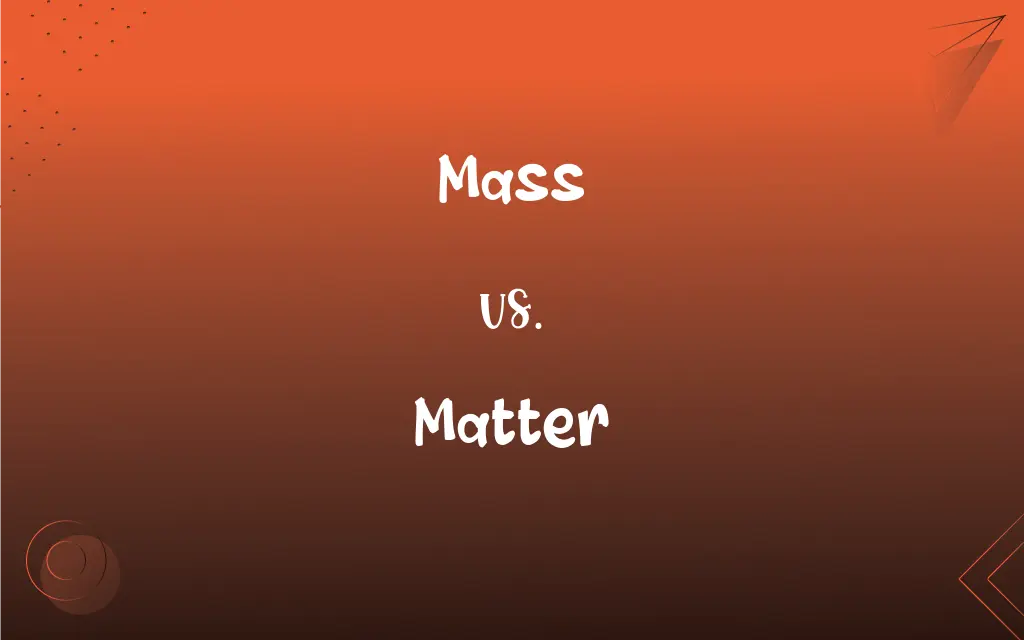Mass vs. Matter: What's the Difference?
Edited by Aimie Carlson || By Harlon Moss || Updated on October 24, 2023
Mass is a measure of an object's inertia and is quantified in terms of kilograms or grams, while matter refers to anything that occupies space and has mass.

Key Differences
Mass is a fundamental property of an object, representing the amount of matter it contains. On the other hand, matter is the physical substance that occupies space and possesses mass, regardless of its state (solid, liquid, or gas).
Mass is an intrinsic property; it doesn’t change unless the quantity of matter in an object changes. Matter, conversely, can undergo changes in its state, such as water freezing into ice or evaporating into steam, but its mass remains constant unless matter is added or removed.
When scientists refer to the mass of an object, they're speaking of a quantitative measure that can be expressed in units like kilograms or grams. In contrast, when they speak of matter, they're referring to the atoms and molecules that make up objects, which can be observed and categorized into elements and compounds.
In the universe, there's a fundamental principle that mass cannot be created or destroyed in an isolated system; it’s conserved. Matter, however, can change form through chemical or physical processes, but the total mass before and after the process remains unchanged.
Gravitation is directly related to mass; more massive objects exert stronger gravitational forces. Matter, in all its forms, constitutes the entities that have mass and hence can exert and experience gravitational forces.
ADVERTISEMENT
Comparison Chart
Definition
A measure of an object's inertia.
Anything that occupies space and has mass.
Changeability
Remains constant unless matter is added/removed.
Can change form (solid, liquid, gas).
Representation
Quantified in kilograms or grams.
Atoms and molecules; categorized into elements/compounds.
Conservation
Cannot be created/destroyed in an isolated system.
Can change form, but total mass remains constant.
Relation to Force
Direct relation to gravitational forces.
Constitutes entities that have mass and exert/experience gravitational forces.
ADVERTISEMENT
Mass and Matter Definitions
Mass
A body of coherent matter.
The mass of birds took flight at the sound.
Matter
A subject or situation under consideration.
The matter of security was discussed in the meeting.
Mass
A measure of an object's resistance to acceleration.
Objects with more mass require more force to move.
Matter
The physical substance that occupies space and possesses mass.
Air, water, and rocks are all forms of matter.
Mass
An intrinsic property of an object that doesn’t change irrespective of its location.
The astronaut's mass remains the same whether he's on Earth or the Moon.
Matter
Substance that makes up physical objects.
Everything we touch is made up of matter.
Mass
A measure of the amount of matter in an object.
The mass of the bowling ball is 7 kilograms.
Matter
A reason for distress or concern.
It's no small matter that the deadline was missed.
Mass
A property that determines the strength of the gravitational interaction with other bodies.
Planets with greater mass have stronger gravitational pulls.
Matter
Solid, liquid, or gas distinguished by its properties.
Water can exist in three states of matter: solid, liquid, and gas.
Mass
Public celebration of the Eucharist in the Roman Catholic Church and some Protestant churches.
Matter
That which occupies space and has mass; physical substance.
FAQs
What is matter?
Matter is anything that occupies space and has mass, such as solids, liquids, and gases.
Does the mass of an object change in space?
No, an object’s mass remains the same in space, but its weight changes due to different gravitational forces.
How is mass related to weight?
Weight is the force exerted on an object due to gravity, and it's directly proportional to its mass.
Can matter change its state?
Yes, matter can change between solid, liquid, and gas states through physical processes like melting or evaporating.
Is air considered matter?
Yes, air is a mixture of gases and thus is a form of matter.
Is mass always conserved?
In an isolated system, mass is always conserved, but it can be converted to energy and vice versa according to Einstein’s E=mc^2.
Is the mass of an electron significant?
An electron has a very small mass compared to protons and neutrons, but it's not zero.
What's the difference between mass and atomic mass?
Mass refers to the amount of matter in an object, while atomic mass is the average mass of atoms of an element, usually measured in atomic mass units.
What is dark matter?
Dark matter is a hypothetical form of matter that doesn't emit light or energy; it's inferred from its gravitational effects on visible matter.
What is mass?
Mass is a measure of an object's inertia, often quantified in kilograms or grams.
Can matter be destroyed?
Matter can change form, but its total mass remains constant; it cannot be completely destroyed.
Can matter exist without mass?
No, all forms of matter have mass, even if it's extremely small.
Does temperature affect mass?
No, temperature affects the energy and motion of particles in matter but doesn't change its mass.
Are light and sound considered matter?
No, light and sound are forms of energy and do not have mass or volume, so they aren't considered matter.
Is mass a scalar or vector quantity?
Mass is a scalar quantity, meaning it only has magnitude and no direction.
Is water vapor considered matter?
Yes, water vapor is the gaseous state of water and is a form of matter.
Can matter convert to energy?
Yes, according to Einstein’s E=mc^2, matter can convert to energy and vice versa.
What units are commonly used to measure mass?
Mass is commonly measured in kilograms (kg) or grams (g).
Why do we measure mass instead of weight in scientific experiments?
Mass is an intrinsic property that remains constant everywhere, while weight varies with the gravitational force.
Is plasma a state of matter?
Yes, plasma is the fourth fundamental state of matter, where gas is ionized.
About Author
Written by
Harlon MossHarlon is a seasoned quality moderator and accomplished content writer for Difference Wiki. An alumnus of the prestigious University of California, he earned his degree in Computer Science. Leveraging his academic background, Harlon brings a meticulous and informed perspective to his work, ensuring content accuracy and excellence.
Edited by
Aimie CarlsonAimie Carlson, holding a master's degree in English literature, is a fervent English language enthusiast. She lends her writing talents to Difference Wiki, a prominent website that specializes in comparisons, offering readers insightful analyses that both captivate and inform.































































